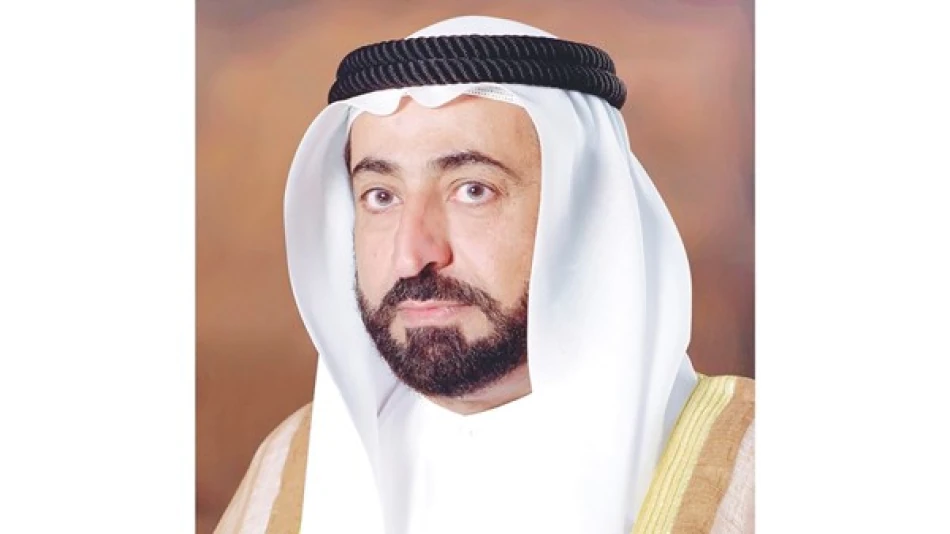
Sharjah Ruler Backs Revitalization of Iconic 'Grand Beirut Theater'
Sharjah Ruler Leads Cultural Renaissance with Major Investment in Beirut's Historic Grand Theatre
In a significant move that underscores the UAE's growing soft power influence across the Arab world, Sheikh Dr. Sultan bin Muhammad Al Qasimi, Ruler of Sharjah, has committed substantial funding to restore Beirut's iconic Grand Theatre through a UNESCO-led international campaign. This investment represents more than financial support—it signals a strategic cultural diplomacy initiative that positions Sharjah as a leading patron of Arab heritage preservation at a time when regional cultural institutions face mounting challenges.
A Strategic Cultural Investment
The announcement ceremony in Beirut brought together key cultural figures including Lebanese Culture Minister Ghassan Salame, UNESCO Director-General Audrey Azoulay, and Beirut Mayor Ibrahim Zeidan, alongside Abdullah bin Mohammed Al Owais, Chairman of Sharjah's Department of Culture, who represented the Sharjah Ruler.
Al Owais emphasized the importance of international cooperation in preserving Arab and global cultural heritage, stating that such initiatives reflect the UAE leadership's commitment to enriching both regional and international cultural landscapes. This collaboration builds on decades of constructive partnership between Sharjah and UNESCO, manifested through various awards and cultural activities.
Recognition of Sharjah's Cultural Leadership
UNESCO's Azoulay praised the Sharjah Ruler's consistent support for cultural initiatives, describing the contribution as reflecting his deep belief in culture's mission and his commitment to building civilizational bridges between peoples. She noted that restoring the Grand Theatre would help it reclaim its role as a center of artistic and cultural influence in the region.
The timing of this investment is particularly significant. As Lebanon continues to grapple with economic challenges and infrastructure decay, international cultural support becomes crucial for maintaining the country's historical role as the Arab world's cultural hub.
Beyond Financial Support: A Vision for Arab Cultural Unity
Lebanese Culture Minister Salame highlighted that the Sharjah Ruler was the first major donor to this cultural project, emphasizing that the initiative transcends mere financial contribution. Instead, it represents a sustained commitment to preserving cultural heritage and reviving Arab arts.
The restoration project aims to enhance artistic communication opportunities between Lebanon and other Arab states, restoring the theatre's function as a platform for creativity and cultural influence. This aligns with broader regional trends where Gulf states increasingly invest in cultural soft power initiatives.
Historical Significance and Architectural Heritage
The Grand Theatre, designed by Youssef Aftimos and built by Jacques Tabet during the 1920s, opened in 1929 as a cornerstone of Beirut's cultural landscape. The venue accommodated 630 seats across an orchestra section and two balconies, featuring a small steel dome operated electrically on rails and an ornate colored glass ceiling covering the lobby.
Decades of Cultural Legacy
Originally designed to serve theatre and opera companies, the venue hosted international performances until the mid-1970s, when Lebanon's civil conflict forced its closure. For nearly five decades, this architectural gem has remained abandoned—a symbol of interrupted cultural life that the restoration seeks to revive.
During the site visit, officials toured the facility's current condition while engineers explained the building's architectural status and highlighted key sections requiring restoration work.
Strategic Implications for Regional Cultural Diplomacy
This investment reflects a broader pattern of UAE cultural diplomacy that extends beyond traditional economic and political partnerships. Similar to how Singapore and other nations use cultural investments to build soft power, Sharjah's approach demonstrates how smaller emirates can punch above their weight in regional influence.
For cultural investors and institutions, this initiative suggests growing opportunities in heritage restoration projects across the Middle East, particularly as international organizations like UNESCO seek private and governmental partners for preservation efforts.
The project also indicates Lebanon's continued relevance as a cultural bridge between East and West, despite ongoing economic challenges—a factor that could influence future cultural tourism and creative industry investments in the region.
Most Viewed News

 Layla Al Mansoori
Layla Al Mansoori






